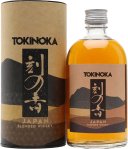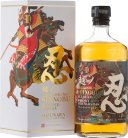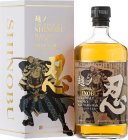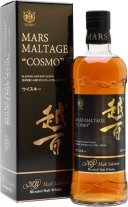Dewazakura Dewa Sansan Junmai Ginjo Non-Vintage Non-Vintage
Pale lemon in the glass. Highly aromatic nose of citrus fruits, orange, and tangerine, ripe melon, custard, and mushrooms. More restrained on the palate, while there is some melon, pear, and white peach flavours, it also tastes of earthy mushrooms, faint herbal notes and (not surprisingly) rice.
Dewazakura Karesansui Tokubetsu Junmai 10 Year Old Non-Vintage
The Dewazakura Karesansui Tokubetsu Junmai 10YO NV 720ml is a truly unique and exquisite sake from the renowned Dewazakura brewery in Japan. Crafted from the finest rice and pure mountain water, this sake has been aged for an impressive 10 years, resulting in a complex and refined taste. On the nose, delicate floral aromas mingle with hints of ripe pear and sweet rice. The sake pours a clear, pale gold in the glass, inviting you to take a sip. On the palate, the sake is smooth and velvety, with a perfect balance of sweetness and acidity. Flavors of green apple, melon, and a subtle nuttiness dance on the tongue, leading to a clean and refreshing finish. This vintage NV sake is a true testament to Dewazakura's dedication to producing exceptional sake. Enjoy it chilled, and savor the beauty and intricacy of this well-aged masterpiece.
White Oak - Akashi Akashi TOJI Malt / Grain Japanese Whisky
Akashi whisky is the only whisky in the world that is made by a Toji (grand-master in the art of sake making) by implementing sake-making methodologies into the whisky making process. The distil pot used is smaller than those used by both Scottish and other Japanese distilleries, which in turn, decreases the levels of fusel alcohol. As a result, Akashi whisky does not require as long of an ageing process, while its core malt (cask strength) is smooth and delicate.
Tokinoka Japanese Whisky
Japanese whisky is not only Suntory or Nikka, there are many other less known distilleries whose reputation continues to grow. And for this new tasting, They choose a blended malt, the White Oak Tokinoka blended malt. The White Oak distillery, located in the city of Akashi (Hyogo Prefecture), was the first to obtain a license for distilling whisky in 1919. Built in 1888 for the production of sake and shochu, at the beginning the distillery produced only blend whisky in a traditional way and specially reserved for the domestic market. Then the site was modified in 1984 to start producing whisky in bigger quantities. The Eigashima Shuzo Company owner of the distillery, produced since 2007 several single malts named Akashi.
The Shinobu Blended Japanese Whisky
SHINOBU (meaning Forbearance in Japanese) Whisky is hand crafted by the creative master blender, Mr. Usami, by carefully selecting whisky from different distilleries which are first reserved in ex-sherry and ex-bourbon casks and then finishing them with precious Japanese Mizunara oak.
The Shinobu Pure Malt Japanese Whisky
Shinobu Whisky is hand crafted by the creative distiller, Mr. Usami, by carefully selecting whisky from around the world which are first reserved in ex-sherry and ex-bourbon casks and then finishing them with precious Japanese Mizunara oak in Japan. The result is a unique fusion of flavours and dynamic explosion in palate yet so smooth and easy to drink. All natural with no colouring.
TOGOUCHI BLENDED BEER FINISH JAPANESE WHISKY
Kurayoshi The San-in Blended Japanese Whisky
Mars Distillery Maltage Cosmo Blended Malt Japanese Whisky
Mars Maltage Cosmo Blended Malt Whisky is an amber gold in colour. On the nose are hints of spicy stewed pears, walnut slices, and prunes. It is a light-to-medium bodied whisky with malt flavours and a smokey but sweet overlay. The finish is long with a mildly oily but spicy flavour. Mars Maltage Cosmo Blended Malt Whiskey is aged in sherry, bourbon, and American White Oak new casks. Cosmo is named after a mountain in the Japan Central Alps close to the Mars Whisky Distillery.
Heiwa Shuzo Furu-Tsuru-Ume Umeshu 10 Year Old
The ‘Furu-Tsuru-Ume’ is made with Nankō Ume fruit from Wakayama. The fruit is steeped in Sake for 4 months, then aged in a tank for 2 years. It is then placed in used oak barrels for further ageing of at least 8 years. This is one of the oldest wood-aged Umeshu in the market. A rich and complex example of Umeshu with a spicy oak character on the finish, this is best served slightly chilled in a wine glass to appreciate the intense and complex aromas and flavours on display here. Once opened the Heiwa 'Furu-tsuru-ume Umeshu 10YO' will last well for at least 12 - 15 weeks, ideally in a refrigerator.









